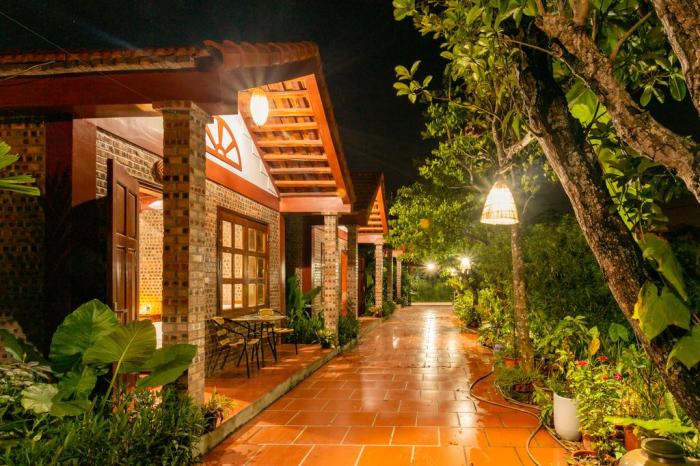
How to find sustainable homestays for eco-conscious travelers is a question increasingly important to mindful adventurers. This guide delves into the world of eco-friendly accommodations, providing practical tips and resources to help you discover authentic and responsible travel experiences. We’ll explore how to identify truly sustainable homestays, utilize online tools for booking, and understand the certifications and practices that make a difference.
Learn how to communicate your sustainability priorities to hosts and how to minimize your environmental impact as a guest.
From understanding the defining characteristics of a sustainable homestay— encompassing environmental stewardship, social responsibility, and economic benefit to the local community—to navigating online platforms and verifying sustainability claims, this guide equips you with the knowledge to make informed choices. We’ll examine the importance of certifications, suggest questions to ask potential hosts, and offer practical advice for sustainable travel practices during your stay.
Discover how to find eco-conscious options in urban destinations and enjoy responsible urban exploration.
Defining Sustainable Homestays: How To Find Sustainable Homestays For Eco-conscious Travelers

Sustainable homestays represent a significant shift in the tourism industry, prioritizing environmental protection, social equity, and economic viability. They move beyond simply offering accommodation; they actively contribute to the well-being of the local community and the planet. This commitment distinguishes them from traditional homestays, focusing on long-term sustainability rather than short-term profits.A truly sustainable homestay operates with minimal environmental impact, actively engages with and benefits the local community, and ensures its own long-term economic viability.
This holistic approach considers the interconnectedness of environmental, social, and economic factors.
Eco-Friendly Practices in Sustainable Homestays, How to find sustainable homestays for eco-conscious travelers
Sustainable homestays employ a range of eco-friendly practices to minimize their environmental footprint. These practices are often integrated into every aspect of the operation, from energy consumption to waste management. For example, many utilize solar panels for electricity generation, reducing reliance on fossil fuels. Others implement water conservation measures like rainwater harvesting and low-flow showerheads. Furthermore, they often source food locally, reducing transportation emissions and supporting local farmers.
Best Practices for Minimizing Environmental Impact
Minimizing environmental impact requires a proactive and holistic approach. This involves careful consideration of energy consumption, water usage, waste management, and sourcing of materials. For example, a homestay might choose to use energy-efficient appliances and lighting, compost organic waste, and use recycled or locally sourced building materials. Furthermore, promoting eco-tourism activities, such as walking or cycling tours instead of car trips, directly reduces the carbon footprint of guests’ stays.
A comprehensive waste management system, including recycling and composting programs, is also crucial.
Social and Economic Benefits of Choosing Sustainable Homestays
Choosing a sustainable homestay offers significant social and economic benefits. By supporting these establishments, travelers directly contribute to the preservation of local culture and environment. These homestays often employ local people, providing jobs and economic opportunities within the community. Furthermore, a portion of the profits may be reinvested in local projects focused on environmental protection or community development.
This creates a positive feedback loop, benefiting both the environment and the local economy. For example, a homestay might partner with a local charity to support environmental conservation efforts or fund educational programs for children. This fosters a sense of community and shared responsibility.
Finding Sustainable Homestays

Choosing sustainable accommodation is a crucial step in minimizing your environmental impact while traveling. By opting for eco-conscious homestays, you directly support businesses committed to responsible tourism practices. This section explores reliable online platforms that specialize in connecting travelers with sustainable lodging options.
Online Resources for Finding Sustainable Homestays
Several reputable online platforms specialize in showcasing sustainable travel accommodations, making it easier than ever to find eco-friendly homestays. These platforms often employ verification processes to ensure the listed properties genuinely adhere to sustainable practices. Using these platforms can help you easily filter your search and make informed choices.
| Platform Name | Website URL | Special Features | Sustainability Certifications |
|---|---|---|---|
| Ecobnb | https://www.ecobnb.com/ | Focuses exclusively on eco-friendly accommodations; detailed sustainability profiles for each listing; carbon offsetting options. | Various certifications depending on the host (e.g., LEED, Green Globe) |
| Booking.com | https://www.booking.com/ | Vast selection of accommodations; filter options for sustainable properties; traveler reviews. | Displays properties with specific sustainability certifications where available, but not exclusively focused on sustainable tourism. |
| Airbnb | https://www.airbnb.com/ | Large selection of properties; host profiles; allows for direct communication with hosts; increasing focus on sustainable options through filters and initiatives. | Doesn’t have a centralized sustainability certification system, relies on host self-reporting and guest reviews to indicate sustainable practices. |
| Responsible Travel | https://www.responsibletravel.com/ | Focuses on responsible and sustainable tourism; detailed information on each property’s environmental and social impact. | Highlights accommodations with specific certifications or strong commitments to sustainability, but doesn’t have a universal certification system. |
Comparison of Online Booking Platforms for Eco-Conscious Travelers
Each platform offers unique advantages and disadvantages for eco-conscious travelers. Consider these factors when selecting a platform for your search.
| Platform | Pros | Cons |
|---|---|---|
| Ecobnb | Dedicated to sustainable tourism; detailed sustainability profiles; strong focus on environmental impact. | Smaller selection of properties compared to larger platforms; may have fewer options in some regions. |
| Booking.com | Large selection of accommodations; user-friendly interface; readily available traveler reviews. | Sustainability filters may not be as comprehensive as dedicated platforms; verification of sustainability claims can be inconsistent. |
| Airbnb | Wide range of options; direct host communication; potential for unique and authentic experiences. | Sustainability verification is largely self-reported; consistency in sustainable practices varies significantly among hosts. |
| Responsible Travel | Focus on responsible tourism; detailed information on environmental and social impact; curated selection of accommodations. | Smaller selection of properties compared to larger platforms; potentially higher prices due to focus on sustainable practices. |
Finding sustainable homestays isn’t just about reducing your carbon footprint; it’s about supporting communities and preserving the planet’s beauty. By following the tips and resources Artikeld in this guide, you can contribute to responsible tourism and enjoy truly enriching travel experiences. Remember, your choices as a traveler have a direct impact; choosing sustainable homestays empowers you to make a positive difference and discover the world in a more mindful and meaningful way.
Embrace the opportunity to connect with local cultures, support ethical businesses, and leave a lighter footprint on the destinations you explore.
Helpful Answers
What are the potential downsides of choosing a homestay over a large hotel?
Potential downsides include less amenities, potentially smaller spaces, and a less structured experience. However, these are often outweighed by the benefits of supporting local communities and experiencing more authentic cultural immersion.
How can I ensure the homestay’s sustainability claims are accurate?
Look for reputable certifications, contact previous guests for reviews focusing on sustainability, and directly ask the host detailed questions about their practices.
What if I encounter unexpected issues regarding sustainability during my stay?
Communicate your concerns directly with the host. If the issue isn’t resolved, consider leaving a review honestly reflecting your experience to help future travelers.
Are there any specific insurance considerations for sustainable homestays?
Standard travel insurance should suffice; however, it’s wise to check your policy for coverage related to unforeseen circumstances that might arise due to the unique nature of a homestay.




